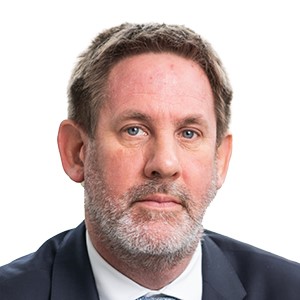Dealmaking activity across both the public markets and private equity remains significantly suppressed at present. EY's latest data reveals global IPO activity proceeds fell 32 percent year-on-year in Q3 2023, while capital raised by PE firms in Q2 declined by 26 percent year-on-year.
The difficult macro climate, which in the UK has been marked by persistent inflation and aggressive interest rate hikes, was a key reference point for participants in Criticaleye’s recent Growth Company Forum, held in partnership with international law firm
DWF.
Stuart Andrews, co-CEO of Zeus Capital, summarised: “Most of the market is struggling to adjust to an environment where the cost of money has gone from effectively zero to well over five percent, after 20 years of very loose monetary policy. We've been in a scenario for two years with heavy inflation and nobody truly knowing the cost of capital. And if you don't know your cost of capital, it’s very hard to move forward.”
Referencing the drop off in activity on the AIM segment of the London Stock Exchange this year,
Grant Humphrey, Partner, Strategy and Transactions at EY, said: “Smaller companies have tended to hold off [dealmaking] given where pricing is at the moment. There's a valuation gap, which is what we see across the wider markets as well.”
However, the market looks forward and there are some signs of optimism, according to Stuart. “We are still very much in the midst of a difficult economic backdrop, but I think it’s fair to say we are at, or very near, to peak rates. And if that is the case, fund managers can start to value and there is a reasonable amount of predictability to the financing environment.”
James Wilson, Corporate Partner at DWF, shared this degree of quiet confidence in the beginnings of a market rebound, based on his involvement in various early-stage conversations around bringing firms to the public market.
“On the legal side, we are constantly talking to companies who are evaluating whether to press the button and try to execute an IPO. It's recently picked up from what we are seeing in the market," he revealed.
However, depressed IPO valuations and a general decline in capital volumes across the UK markets continue to dissuade prospective and existing issuers on both AIM and the Main Market. This trend is also being seen globally, as demonstrated by the EY data presented by Grant, which found that 40 percent of strategic sales activity in Q2 were take-private deals.
Perhaps as a direct result of this long-trending de-equitisation, there remains plenty of money in PE. Stuart said: “There is dry powder and they are still looking for deals and overseas buyers are looking at UK companies.
“But I actually think the public markets will begin to play a fuller role in PE exits as we roll through into the next couple of years – simply because I don’t think the merry-go-round of PE to PE is going to be there when less debt can go into deals,” he continued.
This view of the public equity space regaining some market share was supported by Grant, who referenced a reduction in some of the ‘opportunistic’ take-private deals seen earlier in the year. “We’ve actually seen that activity dropping away a bit so far in Q3 and it might become a little more of a level playing field going forward.”
Matthew Blagg, CEO of Criticaleye, commented: “The decline in deal volumes across PE and the public markets is to be expected as the cost of capital remains high. No doubt companies with strong balance sheets will look for opportunities, but I suspect there is still too much economic and political uncertainty for levels to get back to where they were in the short term. When you look at PE, you also have to think there will be some degree of consolidation underway given the high multiples that have been paid.
“In the meantime, I think CEOs and Boards need to focus on the business fundamentals, ensuring that financial structures are right to support the strategy and drive growth for when market conditions do improve. That also includes having a culture which nurtures talent and high performance.”
Spotlight on ESG
The question of whether ESG has become less of a consideration for dealmakers was posed to panellists during the Forum, given the increasing layers of complexity in diligence processes at present. Indeed, many commentators hold the view that the challenging macro context has pushed sustainability down the priority list.
Stuart disagreed with this stance. “The average fund manager still approaches an investment thesis around valuation, growth and all of the normal factors,” he argued. “But it is very clear that there is overlay, from LPs to Boards, that the investor should also assess what I would summarise as the sustainability of an investment, which is the net effect of the focus on ESG. I think people are getting clearer about what they expect, so I don’t see a slowdown, just more clarification.”
Grant commented on the increasing amount of ESG diligence his team are being asked to do, particularly on the financial diligence side within long form IPOs. “It’s gone from being a part of an ‘add-on’ to almost being a part of the core that’s done just because ESG is embedded within everything now.”
Shareholder awareness of ESG is higher than ever before. It reflects a broader societal shift and increased understanding of the negative impact traditional business practices have on the environment and people, but also – crucially – that ESG can generate a significant return on investment.
Tracey Groves, Head of ESG & Sustainability Advisory Practice, Partner at DWF, said: “I anticipate that shareholder interest will continue to increase beyond just the ESG reporting angle, with investors becoming increasingly curious and asking for evidence of how it's being operationalised. This is based on my experience working with clients right now who are talking to potential investors in order to fuel their growth strategy.”
After an exceptionally muted period for IPOs, M&A and exits while businesses grappled with the uncertainty of the last 12 months, some green shoots look to finally be emerging for dealmaking, given the increasing likelihood of the current interest rate hike cycle coming to an end.
Caution will pervade until year-end at least, but for those leaders looking to re-ignite growth via a deal, the time to start preparations is now. “Over the next six months, I suspect there will be more organisations starting the [dealmaking] process,” James concluded.



